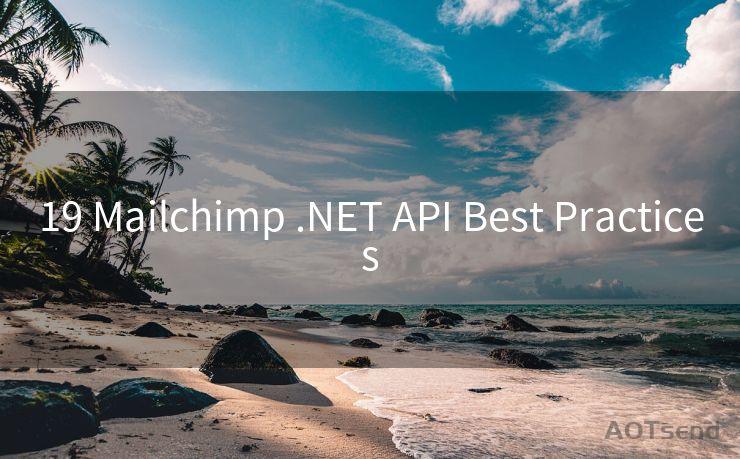19 Mailchimp .NET API Best Practices




When integrating with the Mailchimp API using .NET, it's essential to follow best practices to ensure efficient, secure, and reliable communication. Here are 19 key best practices to keep in mind when working with the Mailchimp .NET API.
1. Understand the API Basics
Before diving into the code, familiarize yourself with the Mailchimp API documentation. Understand the available endpoints, request and response formats, and error handling mechanisms.
2. Set Up Authentication Correctly
Ensure you have the correct API keys and are using them securely. Mailchimp provides different levels of API keys, so choose the appropriate one for your needs.
3. Manage Rate Limits
Be aware of Mailchimp's rate limits and implement logic to handle them gracefully. This might include retrying requests after a cooldown period or using exponential backoff strategies.
4. Optimize Your Requests
Minimize the number of API calls by batching operations and retrieving multiple resources in a single request, if possible.
5. Handle Errors Effectively
Implement robust error handling to manage API errors gracefully. Log errors, provide user-friendly feedback, and take appropriate recovery actions.
6. Use Strongly Typed Objects
When working with .NET, utilize strongly typed objects to represent Mailchimp data. This enhances code readability and maintainability.
7. Keep Your Libraries Up to Date
Regularly check for updates to the Mailchimp .NET library and apply them to ensure compatibility and security.
8. Secure Your API Keys
Never hardcode API keys into your application. Use secure methods to store and retrieve them, such as environment variables or secure credential stores.
9. Test in a Sandbox Environment
Utilize Mailchimp's sandbox or test environment to validate your integration before deploying to production.

10. Monitor and Log API Usage
Implement logging to track API usage, including request details, responses, and any errors encountered.
11. Cache Data Appropriately
To reduce unnecessary API calls, consider caching frequently accessed but infrequently changing data.
12. Validate Input Data
Always validate and sanitize input data before sending it to the Mailchimp API to prevent potential errors or security risks.
13. Follow RESTful Principles
Adhere to RESTful principles when designing your API integration, utilizing HTTP verbs (GET, POST, PUT, DELETE) appropriately.
14. Handle Pagination Correctly
If retrieving large datasets, ensure your code correctly handles pagination and retrieves all necessary data.
15. Implement Retry Logic
Network issues or temporary server outages might interrupt API calls. Implement retry logic with appropriate timeouts to handle such scenarios.
16. Use Asynchronous Programming
Utilize asynchronous programming techniques in .NET to avoid blocking the main thread and improve application responsiveness.
17. Document Your Integration
Document your Mailchimp API integration thoroughly, including endpoints used, data formats, and error handling procedures.
🔔🔔🔔
【AOTsend Email API】:AOTsend is a Managed Email Service for sending transactional emails. Support Email Types: reminders, authentication, confirmations, notifications, verification codes, invoices, password resets, account activations, billing statements, two-factor authentication (2FA), and one-time passwords (OTP) emails, etc. $0.28 per 1000 Emails. 99% Delivery, 98% Inbox Rate.
You might be interested in:
Why did we start the AOTsend project, Brand Story?
What is a Managed Email API, How it Works?
Best 25+ Email Marketing Platforms (Authority,Keywords&Traffic Comparison)
Best 24+ Email Marketing Service (Price, Pros&Cons Comparison)
Email APIs vs SMTP: How they Works, Any Difference?
18. Monitor Performance Metrics
Regularly monitor the performance of your API integration, including response times, error rates, and data usage.
19. Stay Informed About Changes
Subscribe to Mailchimp's newsletters or follow their social media channels to stay updated on any API changes or announcements.
By following these best practices, you can ensure a robust, efficient, and secure integration with the Mailchimp .NET API. Remember to always refer to the official Mailchimp documentation for detailed information on specific endpoints and functionalities.




Scan the QR code to access on your mobile device.
Copyright notice: This article is published by AotSend. Reproduction requires attribution.
Article Link:https://www.mailwot.com/p6689.html



